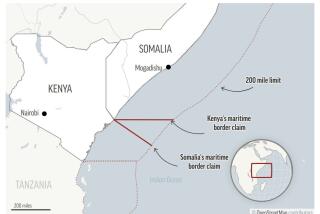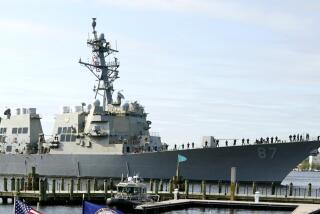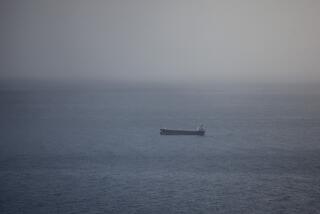The price of piracy
- Share via
First off, it just has to be said: Nice shooting, SEALs. Simultaneously hitting and instantly killing three partly obscured pirates who were holding guns on an American hostage -- and doing it after nightfall, from the deck of a ship in choppy seas -- is a remarkable feat, making us very glad these highly trained and immensely capable naval troops are on our side. Yet, though there’s ample reason to celebrate the rescue Sunday of container-ship Capt. Richard Phillips after a five-day standoff with pirates off the coast of Somalia, it comes with recognition that the aggressive U.S. response risks escalating the piracy threat and endangering the lives of more merchant ships’ crews.
Most of the attacks that have plagued the Horn of Africa over the last year have been relatively bloodless, compared with pirate encounters of the past. Typically, the unarmed crews have surrendered without a fight, and the owners of captured ships have agreed to pay substantial ransoms, sometimes in the multimillion-dollar range. That changed Wednesday when pirates for the first time seized a U.S.-flagged ship -- the Maersk Alabama, carrying humanitarian food aid. The crew fought back and disabled the ship, and the pirates fled to a lifeboat with the captain as a hostage. When the U.S. Navy arrived, negotiators refused to pay a ransom for Phillips.
U.S. officials hope that the tough stance and successful rescue will discourage pirates from attacking American ships. Maybe, but it’s more likely that it will just spur the pirates to bring more crewmen and bigger guns the next time around, and to be more inclined to use them. The threat of death isn’t much of a deterrent to hopeless young Somali men who face a choice between potentially making millions on the high seas or starving on shore.
It’s impossible to fault any of the Americans involved in the hostage drama, from Phillips -- who heroically surrendered himself to save his crew -- to the negotiators who rightly refused to give in to the pirates’ ransom demands, to President Obama, who gave the Navy orders to act if Phillips’ life was judged to be threatened. But the gloves are off now, and ships passing within hundreds of miles of the Somali coast should be ready for a fight.
Shipping companies have been unwilling to arm their crews for fear it would put their employees in danger. That’s no excuse for offering pirates a soft, easy target. Too few have trained their crews in nonlethal anti-piracy techniques, hired armed security guards or contracted with private escort ships. Meanwhile, the international community must do more to protect shipping in these waters, restore the rule of law in Somalia and improve the economic conditions that make piracy such an attractive profession.
More to Read
A cure for the common opinion
Get thought-provoking perspectives with our weekly newsletter.
You may occasionally receive promotional content from the Los Angeles Times.










